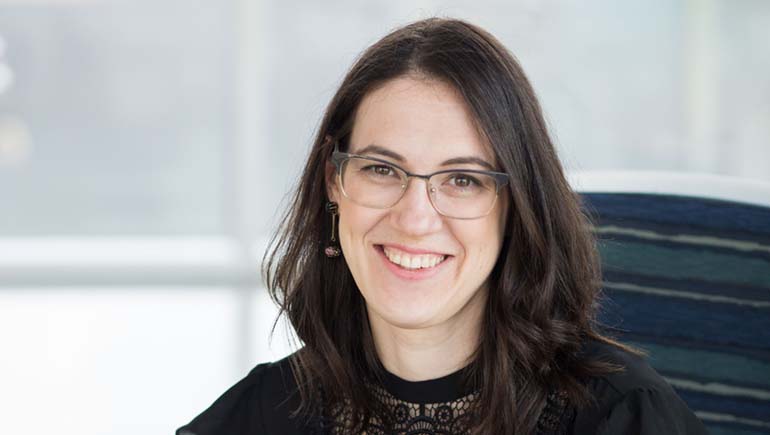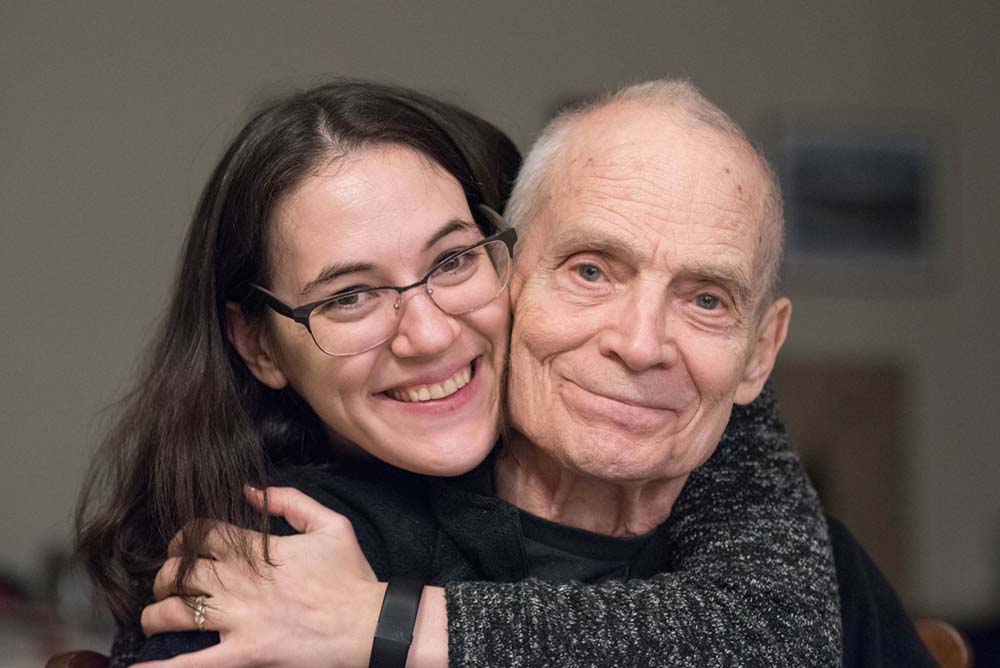Alumni award recognizes Mativetsky’s service to Binghamton, Watson College
Eclectic academic career meant 'I got to do everything I wanted to do'

As a recent grad during the 2008 economic downturn, Hadassah Mativetsky ’07, MS ’12, worked as a server at a banquet hall in downtown Binghamton.
The Binghamton University Alumni Association held an event there during one of her shifts, and Mativetsky saw how the University honored distinguished graduates as well as young up-and-comers who were making a difference for their alma mater. The evening’s key messages and convivial atmosphere stoked her Binghamton pride — which, it must be noted, was already pretty high.
“I’d be standing on the sidelines waiting to refill people’s water and watching the speeches,” she said. “I had a realization that alumni can be really engaged and have an impact on the University.”
On March 18, the Alumni Association honored Mativetsky with the Lois B. DeFleur Distinguished Young Alumnus/a Award during its 2021 Special Recognition Awards ceremony, held online this year because of COVID-19 concerns. The DeFleur Award recognizes alumni who graduated within the last 10 years or are 35 years of age or under, and who are established leaders or demonstrate potential for future leadership.
Mativetsky currently works as a quality engineer at Universal Instruments, but Binghamton University has played a central role in her life ever since she moved with her family to the Southern Tier from Fairbanks, Alaska, in 1988.
Her father, Tom Head, was a longtime member of the math faculty who passed away in 2017. Her mother, Eileen Head, is a professor and undergraduate director for computer science. She remembers seeing the Binghamton Crosbys vocal group perform when she was child, and she still cherishes her memories of Binghamton University student teachers who taught her at her alternative school on the South Side of Binghamton and then at Vestal High School.
“My first Binghamton University degree was from the campus kindergarten!” she said with a laugh.
When she enrolled as a Binghamton undergrad, Mativetsky didn’t have a clear sense of what she wanted to study: “I was more of a general liberal arts kid who studied what was interesting to me, and I didn’t care how it would turn into a job.”
She started her time on campus gravitating toward human development, but later decided on a different path.
“I was the only one, or one of only a handful of people, who transferred from human development to mathematics. It’s not to disrespect human development, but boy, I hated journaling!” she said. “I did not have the emotional intelligence level in college to be able to handle self-reflection at the level required for that degree, so I took a hard left into abstract algebra.”
Ultimately, Mativetsky earned a Bachelor of Arts degree in math, with a minor in Russian and Eastern European studies, from Harpur College of Arts and Sciences. She also took part in a variety of extracurricular activities, including campus radio station WHRW, the Undergraduate Math Club, the Phi Sigma Iota Foreign Language Honor Society, Symphonia, Hillel, and the Nukporfe African Dance and Drum Ensemble.
Another part-time job during that time inspired her next course change: At the Thomas J. Watson College of Engineering and Applied Science, she recorded courses as part of its EngiNet program.
“I’d never heard of systems science before, but I thought, ‘This stuff’s pretty cool!’” she said. “I managed to take Computability and Logic as an undergrad while also getting paid to videotape it.”
Mativetsky received funding from the National Science Foundation as a graduate research assistant, which allowed her to pursue her master’s degree in systems science. She and her team focused on the “Evolutionary Perspective on Collective Decision-Making,” with co-advisors in the School of Management and Watson’s Department of Systems Science and Industrial Engineering.
“I got to do everything I wanted to do, all at once,” she said.
She continued that work after her master’s by collaborating with Distinguished Professor David Sloan Wilson on the Evolutionary Studies Program while also assisting with related initiatives such as the Binghamton Neighborhood Project. (As its religion and spirituality project coordinator, she would visit a different local religious service every weekend.)
She also co-edited Darwin’s Roadmap to the Curriculum, published by Oxford University Press, and she continues to facilitate Prosocial, the first change method based on evolutionary science that enhances cooperation and collaboration for groups.
In mid-2015, Mativetsky heard about a job opening as a software quality engineer at Universal Instruments, and she decided to make the leap into industry: “After working at the University for years trying to support women and underrepresented minorities to go into STEM and pursue careers, I thought, ‘Maybe I should follow my own advice — to walk the walk and see what I’m directing students into.”
A key part of the DeFleur Award is commitment to the University and Alumni Association, and Mativetsky continues to show her love for Binghamton by “lots of little things” while also raising her young daughter with husband Jeffrey (an associate professor in Harpur College’s Department of Physics, Applied Physics and Astronomy).
“I basically say ‘yes’ a lot,” she said. “I give a lot of talks on campus, I do student mentoring and I host students for the Liberal Arts Career Externship program to job-shadow at Universal. I also answer a lot of questions from students and alumni on all sorts of different topics, from environmentalism to how to do a startup app.”
At Universal, Mativetsky is sure to give a Bearcat welcome to any hires from the University.
“I have at work a drawer full of stuff from local alumni events,” she said. “Before COVID started, I would look up new employees on LinkedIn, and if I saw they were Binghamton alumni, I had little gifts I would leave on their desks. All over the company, people still have the Binghamton pennants I gave to them hanging in their cubicles.”

